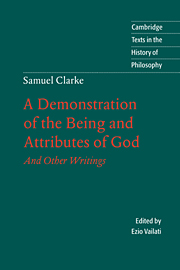Book contents
- Frontmatter
- Contents
- Acknowledgments
- List of abbreviations
- Introduction
- Chronology
- Further reading
- Note on the text
- A Demonstration of the Being and Attributes of God
- Other writings
- I Several Letters to the Reverend Dr. Clarke
- II The Answer to a Sixth Letter
- III The Answer to a Seventh Letter
- IV Letters to Dr. Clarke concerning Liberty and Necessity
- V From Remarks Upon a Book
- VI From Clarke's Sermons on Several Subjects
- VII From A Discourse concerning the Unchangeable Obligations of Natural Religion
- VIII From Four Defences of a Letter to Mr. Dodwell
- IX From A Collection of Papers which passed between the late learned Mr. Leibniz and Dr. Clarke
- Index
- Cambridge Texts in the History of Philosophy
III - The Answer to a Seventh Letter
Published online by Cambridge University Press: 07 January 2010
- Frontmatter
- Contents
- Acknowledgments
- List of abbreviations
- Introduction
- Chronology
- Further reading
- Note on the text
- A Demonstration of the Being and Attributes of God
- Other writings
- I Several Letters to the Reverend Dr. Clarke
- II The Answer to a Sixth Letter
- III The Answer to a Seventh Letter
- IV Letters to Dr. Clarke concerning Liberty and Necessity
- V From Remarks Upon a Book
- VI From Clarke's Sermons on Several Subjects
- VII From A Discourse concerning the Unchangeable Obligations of Natural Religion
- VIII From Four Defences of a Letter to Mr. Dodwell
- IX From A Collection of Papers which passed between the late learned Mr. Leibniz and Dr. Clarke
- Index
- Cambridge Texts in the History of Philosophy
Summary
[Editor's Note: Clarke's critic was Daniel Waterland (1683–1740), a prominent English theologian who criticized Clarke's theological views on the nature of Christ, and divine immensity and eternity. Clarke's letter deals with the reasons for preferring an a priori argument for the existence and perfections of God rather than an a posteriori one. The text is at Wii, 755–8.]
To the Reverend Dr.
Your objection against arguing at all a priori concerning the existence and perfections of the first cause is what many learned men have indeed stuck at. And it being evident that nothing can be prior to the first cause, they have therefore thought it sufficient to say that the first cause exists “absolutely without cause,” and that therefore there can be no such thing as reasoning or arguing about it a priori at all. But if you attend carefully, you will find this way of speaking to be by no means satisfactory. For though it is indeed most evident that no thing, no being, can be prior to that being which is the first cause and original of all things, yet there must be in nature a ground or reason, a permanent ground or reason, of the existence of the first cause, otherwise its existence would be owing to and depend upon mere chance.
- Type
- Chapter
- Information
- Samuel Clarke: A Demonstration of the Being and Attributes of GodAnd Other Writings, pp. 118 - 123Publisher: Cambridge University PressPrint publication year: 1998

